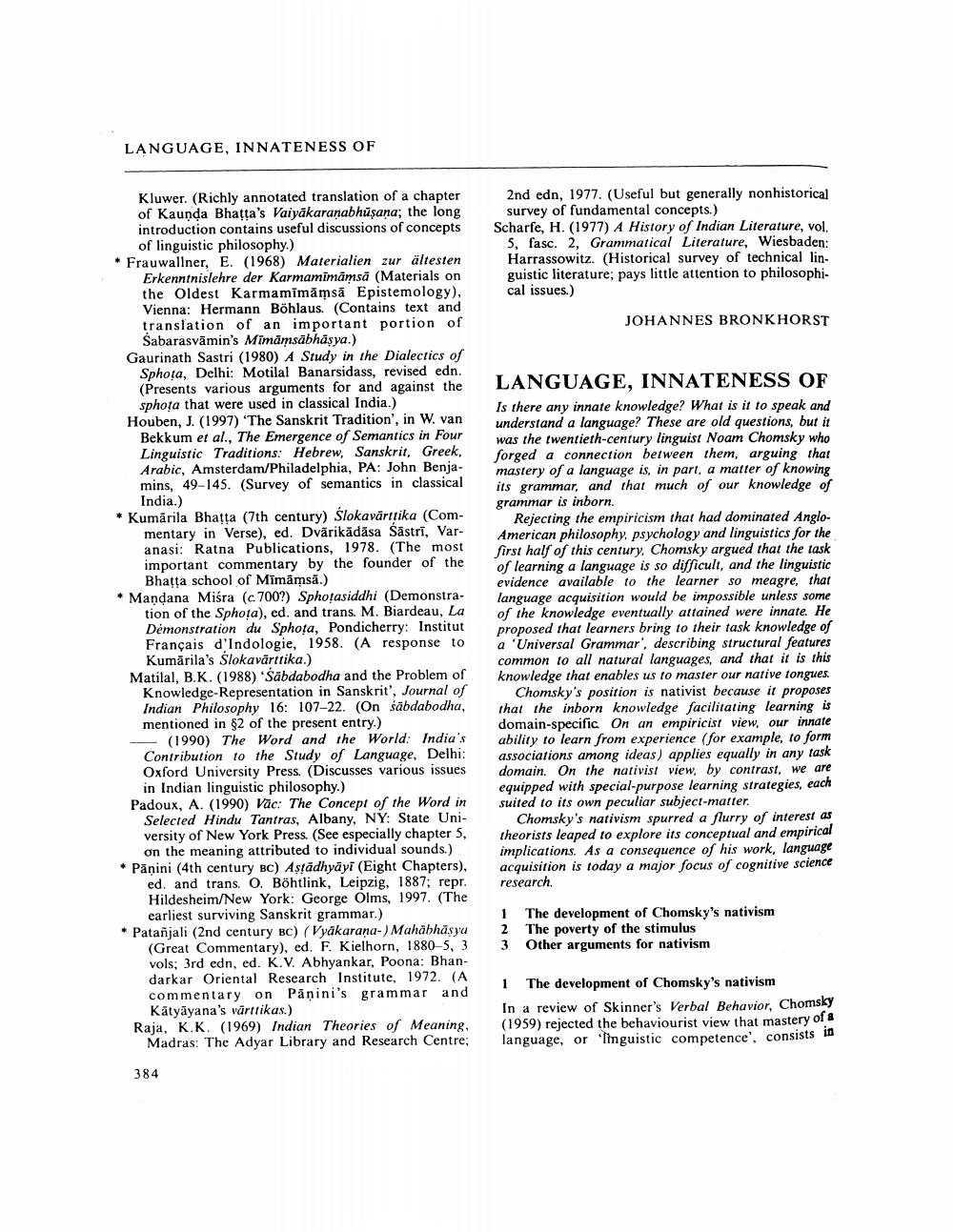Book Title: Language Indian Theories Of Author(s): Johannes Bronkhorst Publisher: Johannes Bronkhorst View full book textPage 6
________________ LANGUAGE, INNATENESS OF 2nd edn, 1977. (Useful but generally nonhistorical survey of fundamental concepts.) Scharfe, H. (1977) A History of Indian Literature, vol. 5, fasc. 2, Grammatical Literature, Wiesbaden: Harrassowitz. (Historical survey of technical linguistic literature; pays little attention to philosophical issues.) JOHANNES BRONKHORST Kluwer. (Richly annotated translation of a chapter of Kaunda Bhatta's Vaiyakaranabhusana; the long introduction contains useful discussions of concepts of linguistic philosophy.) * Frauwallner, E. (1968) Materialien zur altesten Erkenntnislehre der Karmamimamsa (Materials on the Oldest Karmamimamsa Epistemology), Vienna: Hermann Bohlaus. (Contains text and translation of an important portion of Sabarasvamin's Mimamsabhasya.) Gaurinath Sastri (1980) A Study in the Dialectics of Sphota, Delhi: Motilal Banarsidass, revised edn. (Presents various arguments for and against the sphota that were used in classical India.) Houben, J. (1997) "The Sanskrit Tradition', in W. van Bekkum et al., The Emergence of Semantics in Four Linguistic Traditions: Hebrew, Sanskrit, Greek, Arabic, Amsterdam/Philadelphia, PA: John Benjamins, 49-145. (Survey of semantics in classical India.) * Kumarila Bhatta (7th century) Slokavarttika (Com mentary in Verse), ed. Dvarikadasa Sastri, Varanasi: Ratna Publications, 1978. (The most important commentary by the founder of the Bhatta school of Mimansa.) * Mandana Misra (c. 700?) Sphotasiddhi (Demonstra tion of the Sphota), ed. and trans. M. Biardeau, La Demonstration du Sphota, Pondicherry: Institut Francais d'Indologie, 1958. (A response to Kumarila's Slokavarttika.) Matilal, B.K. (1988) 'Sabdabodha and the Problem of Knowledge-Representation in Sanskrit', Journal of Indian Philosophy 16: 107-22. (On sabdabodha, mentioned in 82 of the present entry) - (1990) The Word and the World: India's Contribution to the Study of Language, Delhi: Oxford University Press. (Discusses various issues in Indian linguistic philosophy.) Padoux, A. (1990) Vac: The Concept of the Word in Selected Hindu Tantras, Albany, NY: State University of New York Press. (See especially chapter 5, on the meaning attributed to individual sounds.) * Panini (4th century BC) Astadhyayi (Eight Chapters), ed, and trans. 0. Bohtlink, Leipzig, 1887; repr. Hildesheim/New York: George Olms, 1997. (The earliest surviving Sanskrit grammar.) * Patanjali (2nd century BC) (Vyakarana-) Mahabhasya (Great Commentary), ed. F. Kielhorn, 1880-5, 3 vols; 3rd edn, ed. K.V. Abhyankar, Poona: Bhandarkar Oriental Research Institute, 1972. (A commentary on Panini's grammar and Katyayana's varttikas.) Raja, K.K. (1969) Indian Theories of Meaning, Madras: The Adyar Library and Research Centre; LANGUAGE, INNATENESS OF Is there any innate knowledge? What is it to speak and understand a language? These are old questions, but it was the twentieth-century linguist Noam Chomsky who forged a connection between them, arguing that mastery of a language is, in part, a matter of knowing its grammar, and that much of our knowledge of grammar is inborn. Rejecting the empiricism that had dominated AngloAmerican philosophy, psychology and linguistics for the first half of this century, Chomsky argued that the task of learning a language is so difficult, and the linguistic evidence available to the learner so meagre, that language acquisition would be impossible unless some of the knowledge eventually attained were innate. He proposed that learners bring to their task knowledge of a 'Universal Grammar', describing structural features common to all natural languages, and that it is this knowledge that enables us to master our native tongues. Chomsky's position is nativist because it proposes that the inborn knowledge facilitating learning is domain-specific On an empiricist view, our innate ability to learn from experience (for example, to form associations among ideas) applies equally in any task domain. On the nativist view, by contrast, we are equipped with special-purpose learning strategies, each suited to its own peculiar subject matter. Chomsky's nativism spurred a flurry of interest as theorists leaped to explore its conceptual and empirical implications. As a consequence of his work, language acquisition is today a major focus of cognitive science research. 1 2 3 The development of Chomsky's nativism The poverty of the stimulus Other arguments for nativism 1 The development of Chomsky's nativism In a review of Skinner's Verbal Behavior, Chomsky (1959) rejected the behaviourist view that mastery of a language, or "Tinguistic competence', consists 384Page Navigation
1 ... 4 5 6
